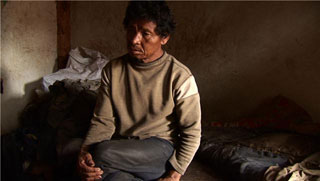Apuda
 CHINA / 2010 / Naxi language / Color / Blu-ray (HD) / 145 min
CHINA / 2010 / Naxi language / Color / Blu-ray (HD) / 145 min
Director, Photography, Editing, Sound, Producer, Source: He Yuan
Northern Yunnan Province, China. Farmer Apuda, of the Naxi ethnic minority, lives together with his elderly and infirm father. In the dim light in the darkened interior of their home, he helps his father put on his clothes, light a cigarette, and get out of bed. In addition to caring for his father, Apuda is kept busy tending to their fruit trees and drawing water. Occasionally one of the neighborhood elders stops by, grumbling about his own son’s lack of kindness. Observing this father and son living in a remote mountain village, with a serene rhythm and rich imagery, the film evokes the drama of life and death.
 [Director’s Statement] I embrace Robert Bresson’s definition of cinematography as an art form that brings image and sound into collaboration with one another. As far as documentary is concerned, I am most willing to view it as a cinematic method, one among many creative approaches to filmmaking, rather than as an artistic form or category in itself. Akin to the practice of painting from live subjects in natural environments, documentary filmmaking represents the point of contact between an artist and the world. Documentary filmmaking means carrying the equipment of cinema (camera, microphone, tripod) out into the world. Just as the artist takes his paints and easel outdoors to paint from life, the documentary filmmaker goes into a small lane, a village, or a wilderness, faces the life that he finds there, and gets to work. This way of working is in answer to a compelling call: the invitation to work in direct and intimate relationship with life and existence. “Learn from nature,” the painters of Chinese antiquity tell us again and again. Documentary filmmaking is precisely a way to extend this course of study into the art of cinematography.
[Director’s Statement] I embrace Robert Bresson’s definition of cinematography as an art form that brings image and sound into collaboration with one another. As far as documentary is concerned, I am most willing to view it as a cinematic method, one among many creative approaches to filmmaking, rather than as an artistic form or category in itself. Akin to the practice of painting from live subjects in natural environments, documentary filmmaking represents the point of contact between an artist and the world. Documentary filmmaking means carrying the equipment of cinema (camera, microphone, tripod) out into the world. Just as the artist takes his paints and easel outdoors to paint from life, the documentary filmmaker goes into a small lane, a village, or a wilderness, faces the life that he finds there, and gets to work. This way of working is in answer to a compelling call: the invitation to work in direct and intimate relationship with life and existence. “Learn from nature,” the painters of Chinese antiquity tell us again and again. Documentary filmmaking is precisely a way to extend this course of study into the art of cinematography.
 He Yuan
He Yuan
Born in Lijiang in 1975, He Yuan has worked at the Ethnographic Film Production Center of the Institute of Ethnography, Yunnan Academy of Social Sciences, since graduating from the East-Asian Institute of Visual Anthropology of Yunnan University in 2001. Two of his previous films, Hani Textile Arts in Jinping (2005) and The Son Is Not at Home (2004), screened at the Yunnan Visual Forum in YIDFF 2005. |
